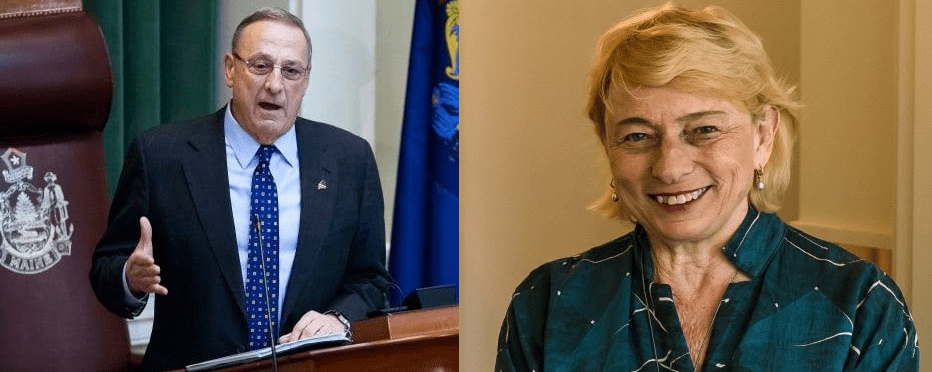This past Wednesday night at the Augusta Civic Center, former Republican Gov. Paul LePage rallied his base and targeted Democrat Gov. Janet Mills.
“Career politicians like Janet Mills and her political cronies have done their best to undermine progress and move Maine backwards,” he said.
But Mills herself hasn’t had much to say publicly about her upcoming battle with LePage — and she’s yet to start campaigning publicly. During a COVID-19 briefing last week, she dodged questions about her re-election.
“I don’t intend to talk politics,” Mills said. “I think it’s way too early to be talking about campaigns. I don’t think the people of Maine want to hear about campaigns at this stage of things.”
Mills said she was busy fighting COVID-19 and working to get the economy back on track.
“That’s what I’m focused on and really nothing else,” Mills said. “This isn’t the proper venue or the time to talk about elections.”
While LePage is on the stump going after Mills’ administration and policies, she’s been not so quietly soliciting her base for donations. Maine Public reported that Mills has sent 30 emails to thousands of supporters since July.
An email from Mills seeking donations last week said, “In the coming months, I will officially launch my re-election campaign.” Yet the next day the governor declined to answer reporters’ questions about whether she was even running.
Mills has been fundraising for a 2022 re-election since March. More than 3,000 people have given Mills more than $500,000, according to a July campaign finance disclosure.
She told the Portland Press Herald on Aug. 1: “I don’t see a good reason not to (run) at this point.”
That’s the closest she’s come to an official announcement. Which is a bit unusual, in Maine’s recent political history.
Past incumbents announced their intentions to seek re-election by autumn of the year before balloting. LePage said in July 2013 that he would run again in 2014. Democrat John Baldacci announced in January 2005 for the 2006 election. Independent Gov. Angus King announced his 1998 re-election bid in October 1997.
Mark Brewer, a political science professor at the University of Maine, isn’t fazed by Mills’ lack of public campaigning.
Fundraising is the key
“If she wasn’t raising money, I think that would be more of a red flag,” Brewer said.
With the coronavirus pandemic all but taking over her first term, some of Mills’ priorities have been hampered. Governors nationally are facing low approval ratings regardless of how they handle the pandemic.
As Brewer put it: “It’s not a good time to be a governor anywhere.”
“At this point, the pandemic may be even more problematic because many people thought and were led to believe by experts that by the time we get to the fall of 2021, we’re going to be in good shape, we’re going to have the pandemic in the rear-view mirror,” he said.
Many voters will blame the state’s leader for COVID-19’s current impact, and LePage used the pandemic to attack Mills during his launch.
“The whole fight over everything related to COVID really has become so intensely politicized that I don’t know that it’s a great time to be a chief executive at any governmental level,” Brewer said. “But certainly, states and the president are the ones that get the most attention.”
Mills’ campaign sent a press release after LePage’s rally, touting her COVID-19 response and other accomplishments, but her name was not on it.
“The stakes of this election could not be higher,” campaign spokesman Michael Perry said in the release. “Now is not the time to go backward.”
With more than a year before Election Day, there’s plenty of time for Mills to campaign publicly, and it’s becoming clear that she’s playing the long game.
“Now the longer it goes obviously, without her formally declaring, then I get a little more curious. But right now I don’t really view it as much of anything,” Brewer said.
Jim Melcher, a political science professor at the University of Maine at Farmington, said Mills may be delaying her public announcement until after the November election, when voters will decide on the Central Maine Power corridor.
Are any voters undecided?
Brewer and Melcher both said that LePage getting a head start on the campaign trail doesn’t give him much of an advantage because his base is already solid.
“I think the general parameters are going to be pretty much set,” Brewer said. “I mean, LePage has got one of the strongest and most devoted bases in Maine politics that I’ve ever seen.”
Melcher compared the race to Donald Trump and Joe Biden’s presidential race.
“This is a little bit like the last presidential election, where an awful lot of people made up their minds a long time ago,” Melcher said. “How they feel about Paul LePage, and to a similar, though maybe somewhat lesser degree, how they feel about (Mills). Neither of these are candidates that need to introduce themselves to anybody.”
With 13 months to go, Maine will see plenty of campaigning in a race that’s sure to draw national attention.
“This election is going to be fascinating,” Brewer said. “There’s the fact that you’ve got a previous two-term governor who is term-limited out, going against the current incumbent. If there was nothing else beyond that, it would be an interesting election.
“But then you bring in some of the personal characteristics of LePage, the fact that LePage and Mills have clashed in the past, and by all accounts don’t like each other. I’m definitely watching it pretty closely at this point.”







